Sir Kazuo Ishiguro石黒 一雄 2017 Nobel Prize in Literature (U.K.
As a second-generation immigrant from Japan, being the first person with the right idea and the right resources available at the right time in history, "luck is a primary key factor for any success," he humbly said, especially in literature. In the U.K., rich in Shakespeare soil and souls, there is never a lack of writers of inspiration. 
Based on his writing, you might make a list of themes that can be extrapolated:
1) Cultural identity and influence: The discussion of Ishiguro's Japanese heritage and its impact on his upbringing, including the influence of Japanese values on his perspectives
2) Setting and historical context: Various novels are set in different time periods and locations, reflecting the exploration of values and ideals under different historical circumstances, such as pre-war and postwar settings.
3) Literary influences and style: Ishiguro's literary inspirations, including Dostoyevsky and Proust, as well as comparisons to other authors such as Salman Rushdie, Jane Austen, and Henry James
4) Recognition and awards: Ishiguro's achievements, including the Nobel Prize in Literature and his appointment as Knight Bachelor for services to literature, reflect his significant contributions to the literary world.
5) Technological and existential themes: the exploration of the dangers of technological advancement, the future of humanity, and the essence of being human in his novel "Klara and the Sun."
6) Adaptation and influence in other media: Ishiguro's adaptation of the screenplay for the film "Living," which was based on the 1952 Japanese film "Ikiru," directed by Akira Kurosawa, and the subsequent nomination of the film for an Oscar Award in the Best Adapted Screenplay category
7) Appetite, desire, solitude, and aspiration collectively influence our assessment of nourishment, hydration, interpersonal connections, and our achievements. Bursts of the brain chemical dopamine are discharged during instances of gratification, yet it remains uncertain how these dopamine indications alter when an individual's preferences adjust.
These themes highlight Ishiguro's diverse influences, historical explorations, and contributions to literature, as well as his engagement with contemporary issues and his impact on other forms of artistic expression, such as film.
*** References:
Sir Kazuo Ishiguro OBE FRSA FRSL (Japanese: 石黒 一雄, Hepburn: Ishiguro Kazuo, /kæ?zu?.o? ?????ɡuro?, ?kæzu.o?/; born 8 November 1954) is a Japanese-born British novelist, screenwriter, musician, and short-story writer. He is one of the most critically acclaimed and praised contemporary fiction authors writing in English, having been awarded the 2017 Nobel Prize in Literature. In its citation, the Swedish Academy described Ishiguro as a writer "who, in novels of great emotional force, has uncovered the abyss beneath our illusory sense of connection with the world".[1]
Ishiguro was born in Nagasaki, Japan, and moved to Britain in 1960 with his parents when he was five. His first two novels, A Pale View of Hills and An Artist of the Floating World, were noted for their explorations of Japanese identity and their mournful tone. He thereafter explored other genres, including science fiction and historical fiction.
He has been nominated for the Booker Prize four times, winning the prize in 1989 for his novel The Remains of the Day, which was adapted into a film of the same name in 1993. Salman Rushdie praised the novel as Ishiguro's masterpiece, in which he "turned away from the Japanese settings of his first two novels and revealed that his sensibility was not rooted in any one place, but capable of travel and metamorphosis".[2]
Time named Ishiguro's science fiction novel Never Let Me Go as the best novel of 2005 and one of the 100 best English-language novels published between 1923 and 2005. He was nominated for the Academy Award for Best Adapted Screenplay for the 2022 film Living. [https://en.wikipedia.org/wiki/Kazuo_Ishiguro]
| Japan (until 1983) United Kingdom (since 1983) |
| University of Kent (BA) University of East Anglia (MA) |
| Novelist short story writer screenwriter columnist songwriter |
| 1981–present |
| Lorna MacDougall ? (m. 1986)? |
| Naomi Ishiguro |
| Winifred Holtby Memorial Prize 1982 A Pale View of Hills Whitbread Prize 1985 An Artist of the Floating World Booker Prize 1989 The Remains of the Day Nobel Prize in Literature 2017 |
| Writing career |
| Drama Historical fiction Science fiction Genre fiction |
| An Artist of the Floating World The Remains of the Day When We Were Orphans Never Let Me Go Klara and the Sun |
Ishiguro has been married to Lorna MacDougall, a social worker, since 1986.[35] They met at the West London Cyrenians homelessness charity in Notting Hill, where Ishiguro was working as a residential resettlement worker. The couple live in London.[14] Their daughter, Naomi Ishiguro, is also an author, and published the book Escape Routes.[36]
He describes himself as a "serious cinephile" and "great admirer of Bob Dylan".[37]
Honours and awards[edit] National or state honours[edit] [OBE] 1995: Appointed Officer of the Order of the British Empire for services to literature[5] 1998:
Appointed Officer of the Order of the British Empire for services to literature[5] 1998:  Chevalier de l'Ordre des Arts et des Lettres by the French government[5] 2018:
Chevalier de l'Ordre des Arts et des Lettres by the French government[5] 2018:  Order of the Rising Sun, 2nd Class, Gold and Silver Star by the Japanese government[38] 2018:
Order of the Rising Sun, 2nd Class, Gold and Silver Star by the Japanese government[38] 2018:  Appointed Knight Bachelor for services to literature Literary awards[edit] 1982: Winifred Holtby Memorial Prize for A Pale View of Hills[5] 1986: Whitbread Prize for An Artist of the Floating World[5] 1989: Booker Prize for The Remains of the Day[5] 2017: Nobel Prize in Literature[1] 2017: American Academy of Achievement's Golden Plate Award[39]
Appointed Knight Bachelor for services to literature Literary awards[edit] 1982: Winifred Holtby Memorial Prize for A Pale View of Hills[5] 1986: Whitbread Prize for An Artist of the Floating World[5] 1989: Booker Prize for The Remains of the Day[5] 2017: Nobel Prize in Literature[1] 2017: American Academy of Achievement's Golden Plate Award[39] Except for A Pale View of Hills and The Buried Giant, all of Ishiguro's novels and his short story collection have been shortlisted for major awards.[5] Most significantly, An Artist of the Floating World, When We Were Orphans, and Never Let Me Go were all short-listed for the Booker Prize (as was The Remains of the Day, which won it). A leaked account of a judging committee's meeting revealed that the committee found itself deciding between Never Let Me Go and John Banville's The Sea before awarding the prize to the latter.[40][41]

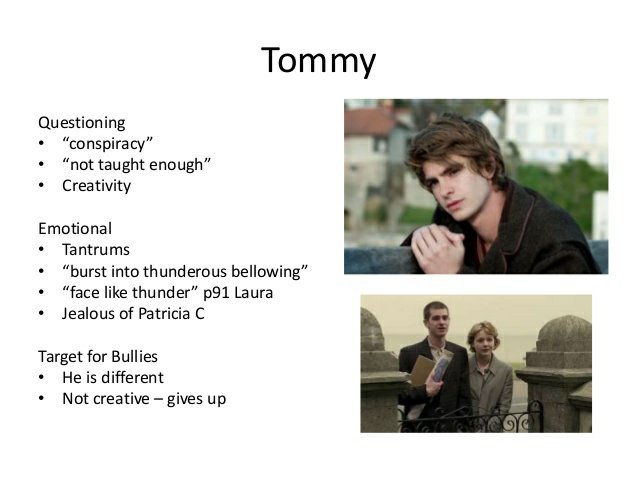
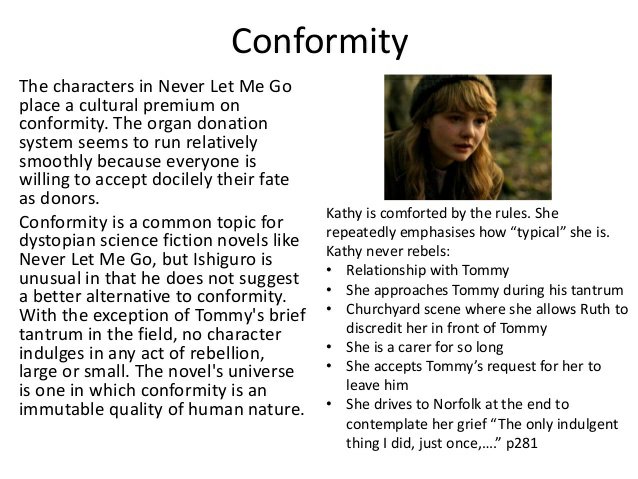



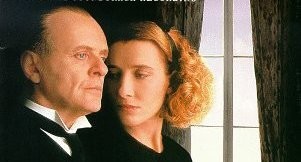
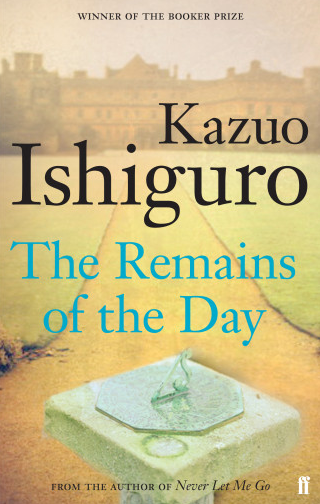



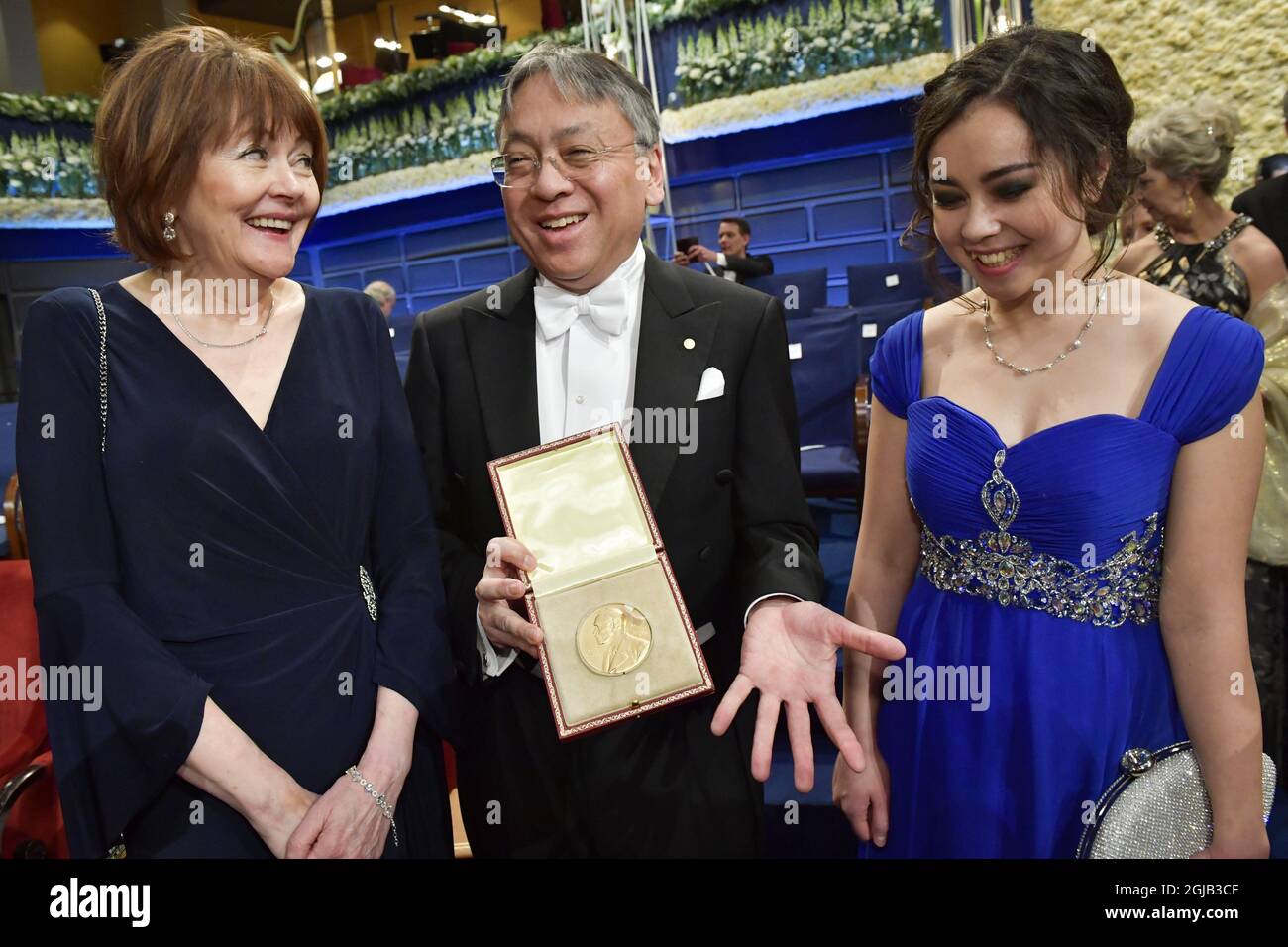 STOCKHOLM 2017-12-10 Kazuo Ishiguro, 2017 Nobel Literature laureate, show his Nobel award for his wife Lorna MacDougall (left) and daughter Naomi Ishiguro after the Nobel
STOCKHOLM 2017-12-10 Kazuo Ishiguro, 2017 Nobel Literature laureate, show his Nobel award for his wife Lorna MacDougall (left) and daughter Naomi Ishiguro after the Nobel